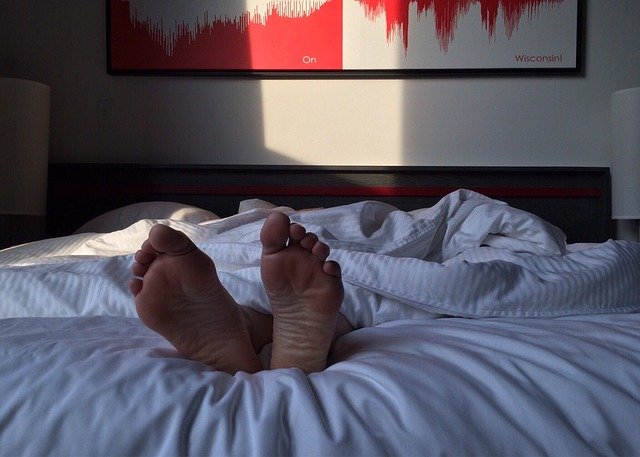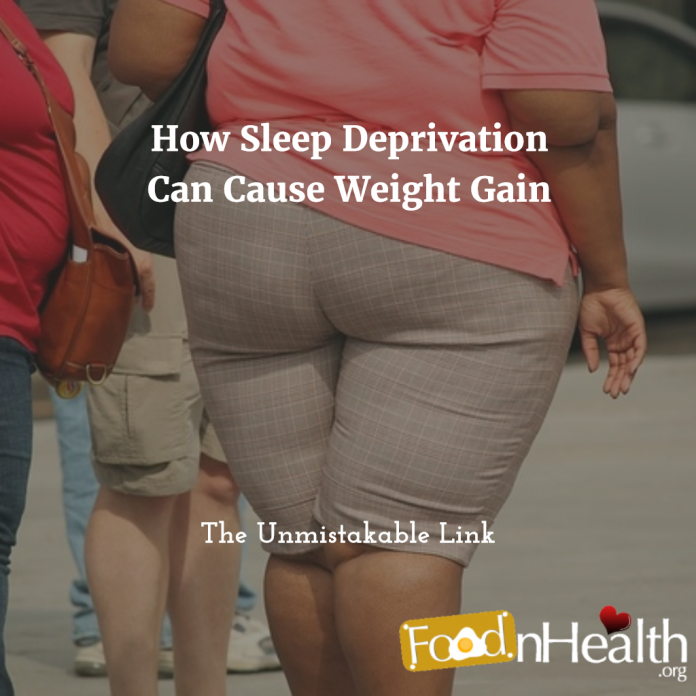We all know the effects of a bad night’s sleep – we wake up feeling grouchy and exhausted, blindly stumbling around in search of coffee, our whole day tainted by not getting enough shut-eye. What about the long-term effects, though? All of the other, niggling little issues in our day to day lives could actually be the result of sleep deprivation.
The amount of sleep we get has a massive effect on our weight, among many things, and it’s now been proven that sleep deprivation can cause weight gain, as well as making it even harder to lose weight in the long-run. I’ll go through how this works, as well as offer some tips on getting a better night’s sleep so that you can start making steps towards getting more rest as well as giving your health a boost…
So, how does it all work? There are several reasons why being tired will be affecting your weight. For one, you’re not going to feel like working out! If you already live a relatively active lifestyle, scrimping on sleep can really start to pull apart your motivation to exercise.
If you’re not already a gym bunny, being tired isn’t exactly the most encouraging thing when you’re trying to decide whether or not to attempt a jog. Your body physically suffers when you’re not getting enough sleep, which can make it very hard to get up and use your muscles – not surprising, really.
Metabolism. We’ve all heard of it and pretty much all of us want a faster one. When we’re tired, our metabolism slows down and processes food a lot more slowly than it normally would. Our bodies panic a bit as our hormones get all jumbled up and start acting out.

What ends up happening is our bodies going into what is referred to as ‘survival mode’ – they cling to anything they can get, unsure of when they’ll eat or sleep again properly. This means our bodies hold on to sugar and fat instead of processing them as normal, leading to weight gain and even more grogginess thanks to energy dips and sugar highs. Bad news all round.
Lack of sleep also takes a toll on your mind and the way it functions, making your reactions slower and everything a little fuzzy around the edges – again, not a great motivator to join a gym. While your body is resting is prime time for it to recover from the day.
The less time you give it to recover, the less energy you have and the worse state your body, and mind, will be in. All in all, not getting enough rest means that you cannot restore your body enough for a workout, however well-intentioned you may be.
If you’re honest, how many nights will you come home, utterly shattered, and prepare a freshly-cooked, organic, low-carb meal for yourself? Yep, I thought so. Being tired means that our healthy habits start to slide and we often do whatever is easiest and requires the least energy.
Takeout, junk food, and carbs are all going to start sneaking into your diet, sadly leading to weight gain on top of the hormone-induced problems you may already be facing.
Of course, hormones had to be involved somewhere, the pesky little things. Your hormones are constantly changing (especially if you’re a woman) and not getting enough sleep only confuses everything more. You’re already tired, stressed and probably a little emotional by this point. To add to it all, your body is now producing more chemicals that are telling it to eat.
The hormones in charge of your appetite are suddenly completely revved up, and those that tell you that you’re full and satisfied start to decline rapidly. Why can’t it be the other way around?! So, essentially, your body is making you want to eat more food and won’t tell it to stop as early on as it normally would. Pretty unfair, really.
When your body is exhausted, it also starts getting pretty stressed out and produces something called cortisol. Not only does this increase your appetite, but it also makes you more likely to reach out to comfort food – carbs, fatty junk food and anything that you can get your hands on quickly.
These kinds of food produce serotonin in the body – the hormone responsible for the same positive, calming energy you get when you exercise. This might sound great, but the effect that this kind of serotonin has on your body is far from the desired effects of exercise, unfortunately.
While we’re on the cycle of ‘tired, eat bad food, feel better but gain weight,’ there’s more bad news. For all the good that junk food has done for satisfying your body and mind, your body can’t process it properly when you’re sleep deprived. The stress your body is under means that it can’t process sugar as well as it normally would – essentially, everything gets a bit blocked up and your body stores the sugar as fat inside the body instead of processing it as normal.

This is thanks to the effects of stress on your insulin levels and your body’s inability to get rid of it naturally. Instead, it stays in your body, increases your blood sugar levels and will leave you feeling worse than before. As far as knock-on effects go, this is not sounding too good…
So, how can you put an end to this cycle? It’s easier than you think, provided you’re open to making some small changes in your everyday life.
- Routine. I know, I know – things change every day, work can keep you up late, kids and partners can really affect your day to day life and it can be hard enough just to get through the day, let alone stick to an original plan. You’ve really got to make an effort to get your body into a routine and try and have a regular time that you get into bed. Sure, you won’t stick to it every single day, but just by making small changes at least 80% of the time, you’ll be amazed at how much better and longer you’ll be sleeping.
- Relax. Again, tricky, of course, but rewarding. Get your body ready for bed – no screens an hour before you sleep, don’t eat just before bed, wind down with a bath/ hot shower, read a book and have a warm drink. This will also help get you into a routine, and your mind and body will automatically start getting ready for bed when you settle into bedtime rituals, meaning you’re more likely to get a good night’s sleep. Think of yourself as one of Pavlov’s dogs, but human.
- Coffee. Of course, I’m not about to deny you the three cappuccinos that it takes to make you awake and alive enough to face the office. Cutting down on your caffeine intake and setting a cut-off point is a sensible step in getting more sleep, however. It may feel like you need a late-afternoon energy fix, but think of how it’s going to affect you when you’re lying in bed a few hours later.
- Technology. We have a world of technology quite literally at our fingertips! There are so many apps out there to help you get the best possible rest – guided meditations to get you to drift off more quickly, sleep-tracking apps to figure out a better routine for you, even hypnosis apps to really get your mind in the mood for rest. Many are free, so it’s worth checking some out and finding one that works for you.
- Prioritizing your health. As this article discusses, sleep deprivation really can lead to weight gain and bad habits. Consider your mental health, too. This kind of behavior isn’t good for your mind. The crazy mix of hormones, the constant exhaustion, dependency on caffeine and energy drinks are all going to be playing havoc with your mind. It may sound extreme, but sleep deprivation can affect your mental health and lead to mood swings among many nasty side effects. You may notice you’re more irritable than usual, your short-term memory suffers and you can’t focus on things as well as you normally can. All of this can be quite emotional and can lead to arguments with loved ones, which only makes things worse and keeps you trapped in this cycle. For your own sake, get some more rest, and you’ll be amazed at the positive effects it has on your physical and mental health. Making your health a priority and reminding yourself why you’re doing all this in the first place will really help keep you on track – and in bed!























